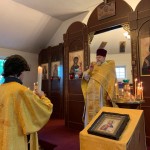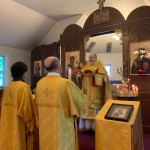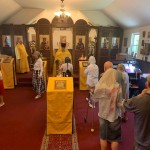On June 23, on the 1st Sunday after Pentecost, the Church celebrates memory of All the Saints who pleased the Lord by their pious lives. On that day we had a nice service at St. George Church. Our parish Rector, Archpriest Igor Tarasov served the Divine Liturgy. After the Gospel lesson he preached the following homily in English:
“Dear brothers and sisters! Today, on the 1st Sunday after Pentecost, we celebrate All Saints Day. And this celebration gives us the answer to an important question: why the whole history of salvation of the human race took place? Why did God create man? Why did God incarnate and become Man? Why did God accept suffering and was crucified on the cross? Why did He die and rise from the dead? Why did He ascend into heaven, and why did He send the Holy Spirit from His Father to His Apostles?”
“This whole history of salvation is remembered in our Church holy days, in our calendar. We celebrate the Nativity of Christ, His Baptism in the Jordan, then we commemorate His Entry into Jerusalem, His sufferings, and then on Pascha we celebrate His Resurrection. After Pascha, 40 days after we celebrate the Ascension into heaven. Then, after 9 more days, we mark the Descent of the Holy Spirit, Pentecost. And today, on Sunday after Pentecost, we sum up: what are the results of the whole history of salvation? And they are the following: that people who follow Christ can acquire salvation; they can become the Saints, they can become Holy.”
“Thus, today’s feast gives us an answer why all this occurred. And all this happened, so the holiness may shine in the hearts of men. The purpose of our Lord to come into the world is that we could become Holy.”
“This is marvelous because we constantly say that we are sinful people. Yet the Lord came into the world, so we may become not sinners but Saints. However, we may say to ourselves that we are not Saints. We are not holy for we acknowledge our weaknesses, recognize our unworthiness, understand our sins and realize our shortcomings. God calls us to holiness but we are sinners. It is easy to fall into despair. But God established His Holy Church, a gathering of the Saints, and the Church does not allow us to be fall into despair, because everyone of us, with no exceptions, every baptized person has a gleam of divine grace. And as much as we are united with God, so much holiness is manifested in our life. Despite our unworthiness, despite our shortcomings, despite our sins, holiness is possible for us. The Lord gives us His grace to change our unworthiness, because He took our sins upon Himself, He came to correct our shortcomings.”
“Celebrating memory of All Saints we see how very different people, children and elderly, men and women, educated and illiterate, rich and poor – are being glorified as Saints by the Church. People of various nations, of different intellect, of different cultural level are honored as Saints because holiness does not depend on those things. Salvation and holiness depend only on how much we open our soul to the grace and operation of the Holy Spirit.”
“And today, rejoicing about those fruits that the Church gave to our life, rejoicing about millions of Saints who fulfilled their calling from the Lord Jesus Christ, let us ask the grace of God for ourselves, let us ask the Lord to bless our life journey that we may become Saints despite our falls and our sins. And we may be holy because for that reason our Lord Jesus came into the world, so no one who believes in Him may not perish but have eternal life.”
“Let us then turn to the multitudes of the Saints glorified today by the Church and let us ask them to elevate their prayers for us, sinners, that we may follow the holy Commandments of God and live along with our Lord Jesus Christ, to whom shall be glory into the ages of ages. Amen.”
Following the dismissal of the Liturgy the Rector preached a short sermon in Russian explaining the content of his English homily. He also reminded the faithful of the beginning of St. Peter’s Fast dedicated to the works of the Holy Apostles.



